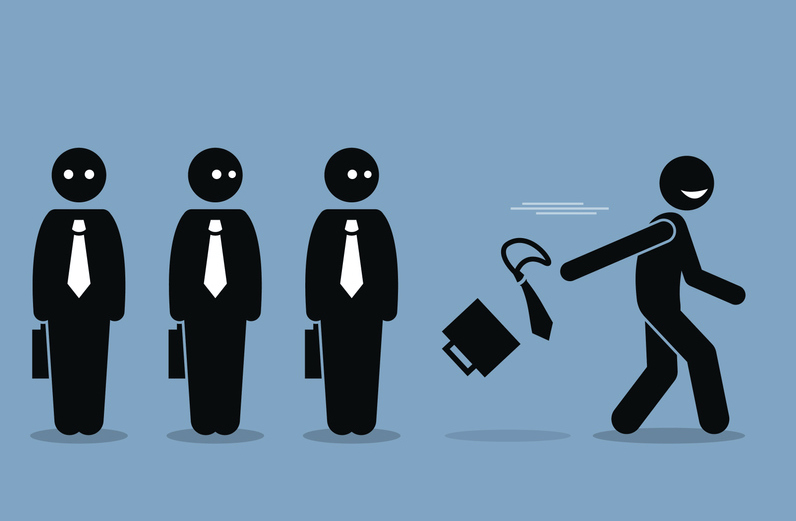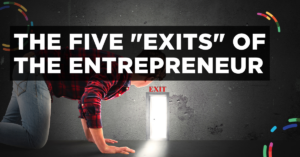
Losing great people is never easy, but it’s even harder when the departing person is a key executive or team leader.
Not only does it create extra work for you and the other members of the team who have to step in to fill the void, it can also be damaging to the morale and “optics” of the company, as a whole.
“After all,” the rest of your team is thinking, “if someone that important was willing to quit, maybe we should start looking around, too…”
And yet, despite all your best efforts, great people will leave your company. Whether they leave to start their own venture or they get poached by a better-funded, better-positioned competitor, they will leave. It’s just a fact of business.
So what do you do? How do you handle things when a key person quits?
Recently, we had just such an experience at The Scalable Company when not one, but two team members left us in the same week. Below, you’ll see the email I sent to the team, which also mirrors the announcement I made at the company all-hands meeting that same week.
NOTE: With the exception of the names (which were changed for privacy reasons), the email, below, is the exact, word-for-word email I sent to the team. Feel free to use it as a template if/when you need to make a similar announcement.
Subj: Saying goodbye to Jane and Jack
What happens when good people leave?
It should come as no surprise that when “bad” people leave, good companies get better. Whether it’s a culture fit issue (wrong person in the right seat) or a role fit issue (right person in the wrong seat), when someone who isn’t a fit departs, the company is stronger because of their absence.
But what about good people?
What happens to a company when the right person who is in the right seat leaves anyway?
This week we learned that two good people will be leaving us: Jane Doe and Jack Smith.
Both Jane and Jack have contributed mightily to their teams and the organization as a whole. Both are well-liked and respected by their peers, and both lived our core values.
But, sadly, both have decided to part ways for their own, personal reasons.
So what happens now? What does this mean for those of us who are still here? What does it mean for Scalable?
Well, I’m happy to report that we’re going to be just fine.
“But how can that be? If good companies get stronger when ‘bad’ people leave, then, by contrast, won’t those same good companies get weaker if good people leave?”
No, actually, that’s not how it works.
Just as good companies are strengthened when “bad” people leave, good companies also grow stronger when good people leave.
I know that sounds a bit paradoxical, so let me explain…
When “bad” people leave, good companies grow stronger through subtraction. In other words, the company is better because the person is gone, leaving room for a new person, who is a better fit, to take their place.
By contrast, when good people leave, companies grow stronger through addition. Yes, they are “gone” as far as their day-to-day presence is concerned, but the work they did…the assets they created…the people they touched…the standards they raised…all those things remain long after they have left the building.
In other words, while they may be leaving us, the company is better because they were here. That’s what I mean by addition!
To put it another way, good people lay a foundation that future team members can build upon. So just as previous team members built foundations that today’s team is building upon, so, too, will future team members build upon the efforts of those who leave us, today.
So while we may experience feelings of sadness for their departure as well as feelings of excitement for what may come next, there is one emotion that we should feel more than any other. And that emotion is…Gratitude.
Gratitude for the work they did.
Gratitude for the foundation they laid.
Gratitude for leaving us better than they found us.Because, at the end of the day, that’s all any of us can hope to accomplish in this life…
…to leave this place better than we found it.
-Ryan
P.S. Just to be 1000% clear, I am NOT suggesting that someone who isn’t a fit for this company is actually a “bad” person anymore than I am suggesting that we are a “bad” company if we aren’t a fit for a “good” person. Both the terms “good” and “bad” are oversimplifications…placeholders. (Hence the use of quotation marks (“”) around the word, “bad.”) Since this is an internal memo, my hope is that you will extend me some grace and literary freedom. Thanks in advance. 🙂
I believe this messaging works because:
- It’s true. Good companies DO get stronger when good people leave for all the reasons I stated above. This isn’t spin! I have seen it time and time again, and you will, too.
- It’s balanced. When anyone quits, it can be tempting to say “Good riddance!” Not only is it common to feel a twinge of bitterness, but you also don’t want to gush about the person too much because the more “essential” you make them sound, the more devastating their loss will feel. Furthermore, you don’t want other people on the team believing they can use moments like these as leverage to exercise power over you, so it’s important that you simultaneously acknowledge the person and their efforts, while at the same time reminding everyone that NO ONE at the company (including YOU) is essential. It’s a delicate balance, but by simultaneously thanking the person for their efforts reminding the remaining team members that the company will be better after they are gone, you’re able to strike that balance.
- It’s hopeful. This messaging acknowledges the reality of the situation while still remaining hopeful and optimistic about the future. Yes, they will be missed, but thanks to their efforts, your best days are still ahead of you.
Because guess what?
They are. 🙂



